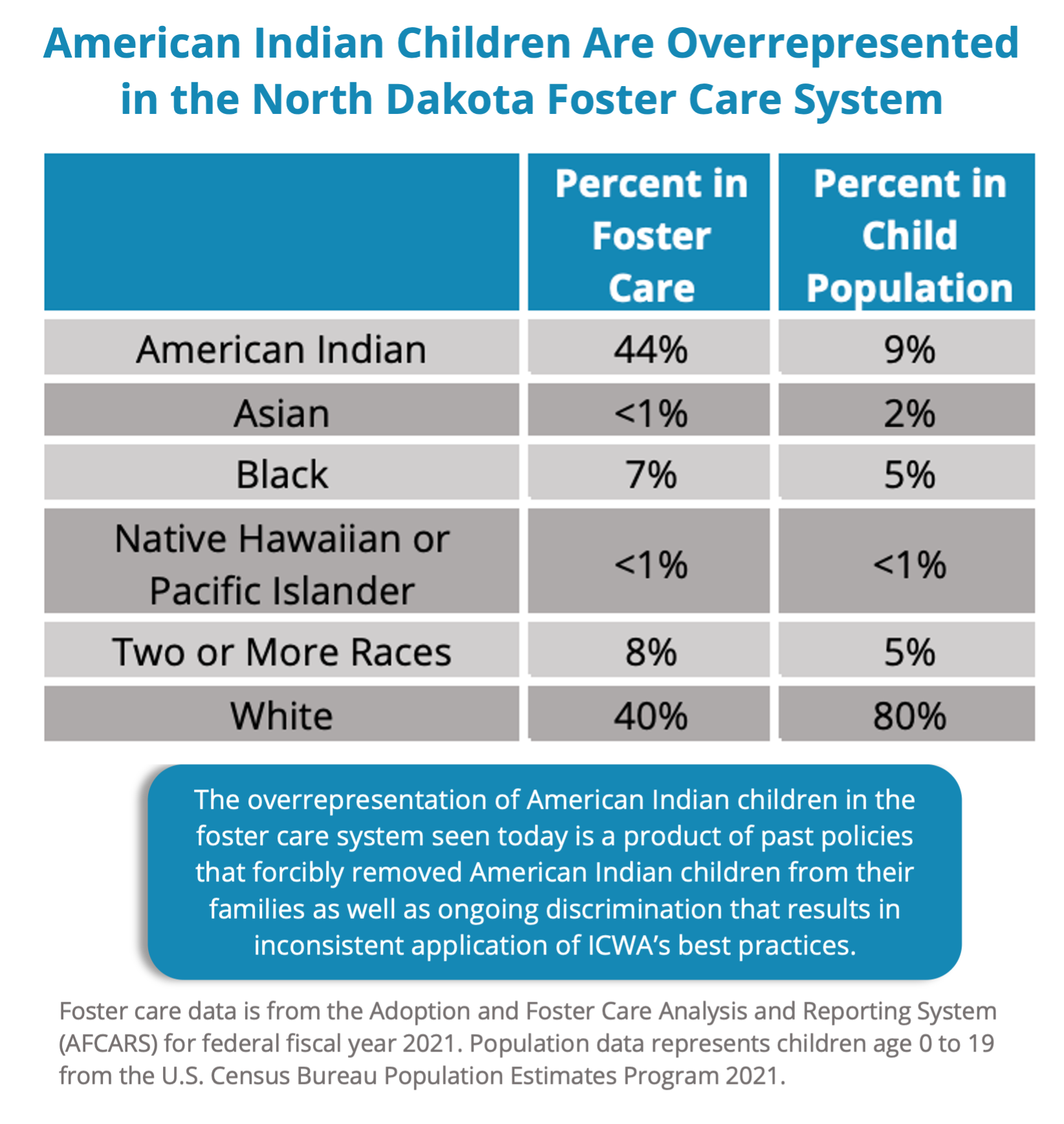Policy Basics: Indian Child Welfare Act (ICWA)
November 2022
In 1978, Congress passed the Indian Child Welfare Act (ICWA) in response to a high number of American Indian children being removed from their homes and placed with families outside their community. ICWA protects the best interests of American Indian children by preventing unwarranted removal of children from their homes and keeping children connected to their families and tribal culture when possible. The protections in ICWA consider the immediate needs of American Indian children and recognize that growing up connected to family and tribal culture is in a child’s long-term best interest.
Experts and practitioners consider ICWA a “gold standard” for child protection practices and policies. For example, ICWA prioritizes an ongoing connection to family and community and stricter guidelines to ensure cases are actively working towards reunification. ICWA helps maintain tribal sovereignty and provides protections for children and families based on their legal status as citizens of tribal nations, not based on race. Unfortunately, the protections guaranteed by ICWA are inconsistently applied, and disparities still exist in protecting children’s safety and well-being. American Indian families are more likely to have their children removed from the home as the first step a caseworker takes and are less likely to be offered supportive interventions that would keep a family together.

ICWA prioritizes keeping children connected to their family and tribal culture when a foster placement is needed, often referred to as kinship care. Research shows that kinship care has both short and long-term benefits. Children in kinship care experience fewer behavioral problems while adjusting to their new environment and less disruption in their education. In the long-term, children placed in kinship care experience better employment and education outcomes and are less likely to be incarcerated as adults.
This fall, the Supreme Court will rule on the Brackeen v. Haaland case that challenges whether ICWA is constitutional. If the Supreme Court overturns ICWA, protections in place for decades will be lost, and disparities like higher rates in the foster care system for American Indian children may worsen.
Disparities Exist in the North Dakota Foster Care System
ICWA is an important part of protecting the best interests and well-being of children in North Dakota and provides protections for the more than 800 American Indian children in foster care across the state.1 American Indian children are overrepresented in the North Dakota foster care system today despite the added protections ICWA guarantees. In North Dakota, American Indian children are in foster care at a rate five times higher than their rate in the general population due in part to ongoing discrimination that results from inconsistent application of ICWA’s best practices. In 2021, American Indian children made up 9 percent of the child population but 44 percent of the children in foster care. At the state level, the disparities are getting worse. Over the last four years, American Indian children made up a growing share of those in foster care, increasing from 33 percent of the foster care population in 2018 to 44 percent in 2021. During this same time frame, there were counties where disparities improved. For example, in Grand Forks County in 2021, American Indian children were in foster care at a rate six times higher than their rate in the general population, compared to eight times higher in 2018. Modest improvements in select counties can be used to understand the local programs or policies that may be making a difference for American Indian children.

ICWA Repairs Past Harm to Tribal Communities
By the time ICWA was enacted in 1978, tribal communities had endured decades of harmful policies where the federal government intentionally separated American Indian families trying to assimilate them into the dominant culture and beliefs. For example, the federal government removed American Indian children from their families and sent these children to boarding schools. Children were stripped of their culture, language, and identity at boarding schools. Another example, the federal government funded the Indian Adoption Project in 1958 to remove American Indian children from their homes, often without any justified safety reason, and place them for adoption with white families. Federal adoption practices in this time period were meant to weaken tribal nations by separating families and assimilating children into the dominant culture. These harmful policies continued for decades until reform started with ICWA.
Present-day Disparities Are Related to Chronic and Ongoing Underinvestment in Tribal Communities
Present-day disparities in the foster care system are also a result of the federal government failing to honor its treaty and trust responsibilities to provide services like health care, education, housing, and economic development in tribal communities. The special trust relationship between the federal government and tribal nations obligates federal support for the general well-being of tribal communities in exchange for tribal land. Tribal communities have been historically left out of funding opportunities for child protection and prevention services that support healthy families. The federal government did not provide dedicated funds for child welfare to tribal nations until 1974, even though states began receiving funding in the 1930s. Even then, the funding was limited to only two grants per year. Starting in 1975, tribal nations were eligible for more widely available funding to support programs that protect the safety and well-being of children. While the federal funding structure today is more inclusive of tribal communities, the amount of funds is still not enough to meet the needs. Tribal nations receive about 1 percent of the federal child welfare funds, even though American Indian children make up 2 percent of the population and have higher rates of risk factors for child maltreatment.
All families need access to stable income, food, safe housing, and health care to thrive. However, chronic underfunding in tribal communities for basic needs like health care impacts overall child well-being and family stability. For example, the federal government has chronically underfunded the Indian Health Service despite its trust obligation to provide health care established by treaties. This means comprehensive health care services are not always available for American Indian families when they need them, and parents or children in tribal communities are often left without the preventative support and services they need.
ICWA is Essential for Supporting American Indian Children and Families in North Dakota
Considering the ongoing disparities in North Dakota’s foster care system, the protections guaranteed by ICWA are crucial as the state works to lessen these disparities. Additionally, the federal government should fulfill its trust and treaty responsibilities and adequately fund child well-being and other services to support families in tribal communities.
North Dakota policymakers should consider the disparities in the state’s foster care system when making decisions for funding state services. More funding is needed to support preventative services that help families before a child needs to be removed from their home. Additionally, the state should consider providing higher funding to communities with a greater need to address disparities and begin undoing the harm tribal communities and families have endured for decades.
Footnotes
- Foster care data referenced for North Dakota comes from the Adoption and Foster Care Analysis and Reporting System (AFCARS) for federal fiscal years 2018 to 2021.

